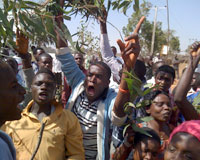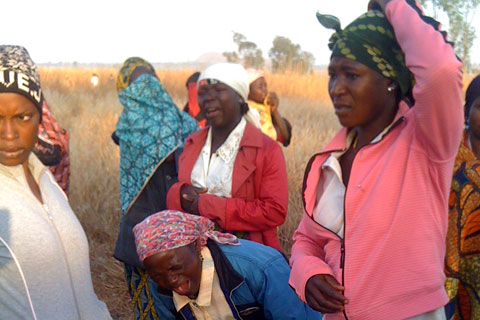Nigeria: How the media once again short-change the victims of violence
by - 4th May 2011
 Western media reports which explain the post-election violence in Nigeria as a straight religious fight between the Christian south and the Muslim north fail to recognise the socio-political complexities of the region.
Western media reports which explain the post-election violence in Nigeria as a straight religious fight between the Christian south and the Muslim north fail to recognise the socio-political complexities of the region.
An estimated 500 people were massacred, bludgeoned to death and burnt alive in northern Nigerian states since Goodluck Jonathan of the People’s Democratic Party (PDP) was announced president following voting on 16 April.
The Guardian put the mayhem down to “religious tensions” arising after supporters of presidential candidate General Muhammadu Buhari – a Muslim from the north –lost out to Jonathan, a Christian and a southerner.
Supporters of Buhari and the Congress for Progressive Change (CPC) took to the streets amid claims of vote rigging to favour Jonathan and the People’s Democratic Party (PDP). Buhari himself told Al Jazeera: ‘We have evidence in our hands that the computers [used in the voting process] were programmed to produce rigged results.’
This is despite Western bodies including the UK Foreign Office, the European Union, the US International Republican Institute and the Commonwealth secretariat among those hailing the elections a success.
In their reporting of the situation in Nigeria, many Western media outlets such as the Guardian stated that the management of these elections by Professor Attahiru Jega and the Independent Electoral Commission was a success and moved Africa’s most populous nation closer to true democracy.
But despite the well-executed administration of the electoral process this time around, the fact remains that hundreds have been killed and a further 40,000 displaced.
In northern states, including Kaduna, Kano, Bauchi and Zaria, the homes and businesses of both Christians and Muslims burned alongside churches and mosques.
While the majority of the attacks, which included the murders of several of the Nigerian Youth Service Corps (NYSC) employed to administer the elections, were perpetrated by disaffected Muslim youths, Christians carried out reprisal attacks in the rural areas of Kaduna State for example, as Daily Nation reports.
Despite places of worship ablaze and religious believers massacred, media outlets such as the BBC suggest ‘the violence has more to do with poverty and economic marginalisation in the north than religion’.
Nigeria’s most revered Muslim, the Sultan of Sokoto and president-general, Nigerian Supreme Council for Islamic Affairs (NSCIA), His Eminence Alhaji Muhammad Sa'ad Abubakar, said the recent insurrection was purely political and not religious. He hit out at claims made by Pastor Ayo Oritsejafor, national president of the Christian Association of Nigeria (CAN), that Buhari had a ‘religious agenda’ in calling on his supporters to ‘lynch anybody attempting to rig the elections’.
As reported by African media outlets including AllAfrica.com and InDepthNigeria , His Eminence said: ‘The insinuation by Pastor Oritsejafor that the post-election violence was a plot hatched by Muslims as part of their “religious agenda”, which merely “took advantage of the political situation” is both preposterous and unfounded.
‘The whole crisis was unfortunate. It was equally a great tragedy that the crisis took the turn it did, leading to the burning of both mosques and churches and to the unfortunate loss of life on both sides of the religious divide.’
African media, including Next newspaper in Lagos, reports that both Mr Oritsejafor and the Sultan came together in a statement issued by the Nigeria Inter-Religious Council to denounce the violence as political and without religious basis.
While the cause of the violence may have other factors, there can be no doubt that it is being carried out in religion’s name because religion in Nigeria is inextricable from politics – which explains the West’s confused coverage.
Following the end of military rule in Nigeria in 1999, the PDP - which splits its leadership on religious grounds – was in power with Olusegun Obasanjo as president until 2007.
Muslim politicians had insisted that since Obasanjo was a Christian, a Muslim should be in power until at least 2015. But when Muslim president Umaru Yar’Adua died in office last year, he was replaced by Jonathan – a Christian.
Nigeria’s presidents are identified by their religious affiliation, where there is no separation of religion and state and where religious leaders expect to have their voice heard in the political sphere. In calling Muslims to arms against alleged vote-riggers, Buhari was using the power of religion to rally the masses.
As the BBC reports, Muhammad Ashafa, an imam who promotes inter-religious dialogue in Nigeria with pastor James Wuye, said: ‘Religion has been hijacked as just one of the major instruments used and abused by politicians. Religion is a tool used by those politicians, particularly if they are losing, in order to win favour by harnessing the passion of religion so deeply felt in our society.’
Speaking to Lapido Media, Lagos-based writer Chris Ihidero puts the willingness of the masses to follow leaders on the basis of their religious affiliation largely down to poverty: ‘The fighters themselves are as much victims as the people they kill, as they have been left uneducated by the northern élite and made to remain uncivilised in order to be used for purposes such as this.
‘Politics is at the core of the violence; religion is only employed to disguise the truth.’
 Criticising the Western media coverage of the post-election violence, he added: ‘The coverage has been too general in too many parts. In the reports I have seen on CNN, Al Jazeera and the BBC, too little time has been spent looking at the specifics of the situation.
Criticising the Western media coverage of the post-election violence, he added: ‘The coverage has been too general in too many parts. In the reports I have seen on CNN, Al Jazeera and the BBC, too little time has been spent looking at the specifics of the situation.
‘It's been about how post-election violence has erupted in violent northern Nigeria. Body counts have been estimated and many of the reports have pitched a north versus south scenario.
‘A lot of them have missed the internal wranglings, the possibility of sponsorship of the violence, the perpetrators who have done this time and again without ever having to face criminal charges, the irresponsibility of state governors who have been unable to do anything about these killings overtime.
‘The path to true reconciliation and an end to this recurring inhumanity will only begin when all concerned begin to pay attention to the specifics.’
For Louis Eke, Nation Desk Editor at Next newspaper in Nigeria, the religious angle is being taken because this is the most familiar story in the north of Nigeria. He told Lapido: ‘If the attacks were not religious, churches would not to have been targeted. In reality, however, given the history of that region of the country regarding their attitude towards Christians, it is hardly a surprise that religious meaning is being read into the incident. So while the riots were triggered by politics, the deep-seated animosity towards Christians could have fuelled the violence.’
Although the full official results of the gubernatorial elections have not yet been released, early indications suggest that CPC has surprisingly fared worse than it did in the presidential election – suggesting a backlash from former supporters.
Nigerian broadcaster Amaka Igwe thinks this may be due to Buhari’s tactic of using religious rallying for a political end having backfired.
She told Lapido Media: ‘His mistake was in planning an insurrection against the emirs, clerics and imams that he perceived were not supporting him, including the Sultan of Sokoto who had warned voters not to vote along religious lines.’
Security had to be beefed up at the Sultan of Sokoto’s palace when youths threatened to attack it during the eruption of violence in the area following the presidential election results.
Mrs Igwe described the violence as ‘political puppeteering’ and down to exploitation of the Muslim youth. She said: ‘Buhari has a cult following and used this to gain advantage by invoking the name of religion. When people like this want to force an issue, they lie and make out that it’s to do with religion when it’s purely covering up political aims.
‘There are a range of issues here. Most of the people that carried out the violence were the uninformed who thought they were fighting on behalf of Islam against Christians. Some others also got involved - the uninformed, a willing army, easily persuaded when people give them petrol in gallons and machetes and guns. But for the people who planned it, this was purely political.’
Speaking to journalists at his Lagos residence, Nobel Laureate Professor Wole Soyinka also said the violence was not spontaneous, but orchestrated.
This Day reports him as saying: ‘This violence is unacceptable because these killings were done on a wrong and non-existent foundation. Such cases are unacceptable.
‘These killings were carried out on the basis of lies. In my view, they were planned well beforehand. Anybody who said they were not planned before hand was a very naïve individual. From the way I was receiving reports, I did not detect any case of spontaneity.’
- Log in to post comments
